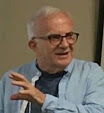Ask the Horse
Dainin Katagiri, a Zen Roshi in Minneapolis, MN, once said that contemporary civilization is like a rider who storms through a village on a runaway horse. People shout, "Where are you going?" he yells back, "Ask the horse! Ask the horse!"
He is right. Wherever we look we see violence and destruction. The past and the future are becoming mirrors of our present turmoil. Looking backward, we argue over the meaning of Civil War memorials. Looking forward we anticipate lethal autonomous weapons systems engaging each other without human intervention.
Once we were confident of our purposes and destiny. We trusted the advances won by education, the inventions spawned by technology and the idealism generated by democratic faith, but this confidence has been shaken. The vast gains of knowledge, our technological strides, the rich accumulations of centuries of cultural development — these render more tragic our present disarray. Science itself leads to conundrums. Faith is ossified into hardened categories.
We find ourselves surrounded by problems we can neither fully understand, nor reject as unintelligible, observed J. T. Fraser (Of Time, Passion and Knowledge). We are driven by aspirations whose goals we cannot hope to reach, yet cannot accept as unreachable. We teeter between belief and unbelief, between an almost limitless faith in our own abilities and a disgust at the pettiness, stupidity, and cruelty of a race enamored with destruction.
Undeserved suffering has become so widespread in our world that it is commonplace. Violence surrounds us — the overt violence of terrorism, warfare and crime, and the covert violence of hunger and poverty, of unjust social and economic systems that perpetuate human degradation. Is human life "solitary, poor, nasty, brutish and short" as Thomas Hobbes famously proclaimed? Shall we reconcile ourselves to what Sigmund Freud called the "normal unhappiness" of human existence?
Dr. Hans Küng once addressed a large gathering of clergy at Riverside Church in New York City. We were in the midst of the Vietnam War, but first he spoke to us about the Shoah and the widespread spiritual desolation it engendered. How could anyone believe in anything after the Holocaust, he pondered? How could we embrace a higher vision, a nobler calling or a greater purpose after that? "I can understand those who turn away from God after this," Küng said. "But as for me, I can only go on after this because I believe in God. Belief in God helps me to overcome such catastrophic events."
What difference can belief in God make? To Küng it means that striving for absolute justice is absolutely justified, that truth will be known, that divisions will be overcome, and that warfare - someday - will be ended.
It means, he added, that the poor in spirit will receive the kingdom of God, the gentle will have the earth for their heritage, those who mourn will be comforted, and those who hunger and thirst for righteousness will be satisfied. It means that the merciful will have mercy shown to them, peacemakers will be called children of God, and the pure of heart will see divinity. It means that we do not die into nothingness, but into God. It means, he concluded, "the fulfillment of the oldest, strongest and most urgently felt wish of humankind: that we can hope again."
(Water color of horse by Chen Zheng-Long, 2000)
* * * * *
(Water color of horse by Chen Zheng-Long, 2000)













